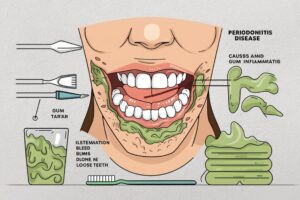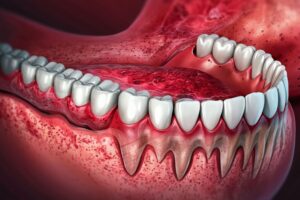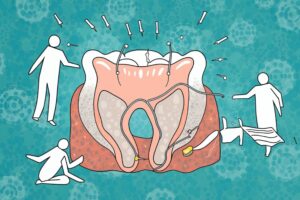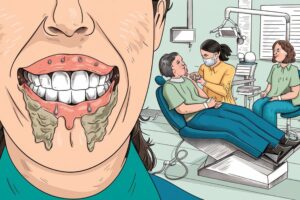What are the Causes and Symptoms of Periodontitis and How to Treat?
Periodontitis is a severe gum infection that harms the soft tissue and weakens the bone that holds your teeth in place. It is a common dental problem that, if left untreated, can lead to tooth loss and other complications.
Understanding the causes, symptoms, and proper treatment of periodontitis is essential for maintaining good oral health and preventing the progression of this condition.
This article aims to explore the various factors that contribute to periodontitis, the signs and symptoms to watch out for, as well as effective treatment and preventive measures. By delving into the complexities of periodontitis, individuals can better equip themselves to protect their smiles and overall well-being.

Table of Contents
ToggleIntroduction to Periodontitis
Periodontitis is an inflammatory disease that affects the tissues, the gums, periodontal ligament, teeth supporting structures and alveolar bone. It is one of the most common oral health conditions, with studies indicating that nearly half of adults over the age of 30 in the United States have some form of periodontitis.
The disease is characterized by the accumulation of plaque and calculus on the teeth, which leads to an inflammatory response by the immune system, ultimately causing destruction of the surrounding tissues.
The main risk factors for developing periodontitis include poor oral hygiene, smoking, diabetes, and genetic predisposition. Poor oral hygiene practices, such as inadequate brushing and flossing, allow plaque and calculus to build up on the teeth, creating an ideal environment for bacteria to thrive and cause inflammation.
Smoking is known to negatively impact the immune response in the gum tissues, making individuals more susceptible to developing periodontitis.
Diabetes also plays a significant role in the development and progression of the disease, as uncontrolled blood sugar levels can impair the body’s ability to fight off infections.
In addition to causing tooth loss, periodontitis has been linked to several systemic health conditions, including cardiovascular disease, diabetes, and respiratory infections. The chronic inflammation associated with periodontitis can lead to increased levels of inflammatory markers in the blood, which has been shown to contribute to the development of cardiovascular disease.
Furthermore, individuals with diabetes are at a higher risk of developing periodontitis, as the disease can make it harder to control blood sugar levels, leading to further complications. Overall, it is important for individuals to maintain good oral hygiene practices and seek regular dental care to prevent the development of periodontitis and its associated health risks.
Read more about “Myeloid Leukemia Causes, Symptoms, Prevention and Treatments”
Impact of Periodontitis on Oral Health
Periodontitis is a severe form of gum disease that can have a significant impact on oral health. The condition is caused by bacteria that accumulate in the gums, leading to inflammation, bleeding, and eventual destruction of the surrounding tissues. If left untreated, periodontitis can result in tooth loss and other serious complications such as bone loss in the jaw.
Additionally, research has shown that the inflammation caused by periodontitis can also have systemic effects on the body, increasing the risk of conditions such as heart disease, diabetes, and stroke.
Maintaining good oral hygiene practices such as regular brushing, flossing, and dental check-ups are crucial in preventing periodontitis. Additionally, early detection and treatment of the condition are key in preventing further damage to the gums and teeth.
Dentists may recommend deep cleaning procedures such as scaling and root planing to remove plaque and calculus from below the gumline. In severe cases, surgical interventions may be necessary to reduce pocket depths and restore the health of the gums.
Overall, understanding the impact of periodontitis on oral health and taking proactive measures to prevent and treat the condition are essential in maintaining a healthy mouth and overall well-being.
Read more about “How to Cope with Depression in LGBTQIA+ Communities?”
Importance of Addressing Periodontitis Early
Periodontitis is a serious dental condition that can have severe consequences if left untreated. It is a chronic inflammatory disease that affects the tissues surrounding the teeth, leading to gum recession, bone loss, and eventually tooth loss. Early intervention is crucial in preventing the progression of periodontitis and preserving the overall oral health of an individual.
By addressing periodontitis early, patients can avoid the need for extensive and costly treatments such as gum grafts, bone grafts, and dental implants.
Furthermore, untreated periodontitis has been linked to an increased risk of systemic illnesses such as heart disease, diabetes, and respiratory infections. Therefore, it is essential for individuals to prioritize their oral health and seek treatment for periodontitis at the earliest signs of the disease.
In addition to the physical consequences of untreated periodontitis, the condition can also have a significant impact on an individual’s quality of life. Periodontal disease can cause pain, discomfort, and difficulty eating, speaking, and smiling.
In severe cases, individuals may experience embarrassment and self-consciousness due to the appearance of their teeth and gums. By addressing periodontitis early, patients can avoid these negative effects on their daily lives and maintain their confidence and self-esteem.
Early treatment also allows for a more conservative approach, minimizing the need for invasive procedures and reducing the risk of complications. Overall, the importance of addressing periodontitis early cannot be overstated, as it not only benefits the individual’s oral health but also their overall well-being and quality of life.
Read more about “What are the Causes and Symptoms of Peripheral Artery Disease and how to treat?”
Causes of Periodontitis
Periodontitis is a severe gum infection that can harm the soft tissue and weaken the bone that holds your teeth in place. There are several factors that contribute to the development of periodontitis.
One of the main reasons for this condition is inadequate oral hygiene. Failure to properly brush and floss your teeth can allow plaque to build up on your teeth and gums, leading to infection.
Additionally, smoking cigarettes or using other tobacco products is a major risk factor for periodontitis. Smoking can weaken your immune system, making it more difficult for your body to defend against infections, such as those that affect your gums.
Another common cause of periodontitis is genetics. Some people are more predisposed to developing gum disease due to their genetic makeup. Studies have shown that individuals with a family history of periodontitis are more likely to suffer from the condition themselves.
In addition, certain medical conditions can increase your risk of developing periodontitis, such as diabetes and autoimmune diseases.
Read more about “Atherosclerosis V/S Arteriosclerosis and Their Impact on Heart Health!”
These conditions can weaken your immune system and make it harder for your body to fight off infections in your gums. Overall, a combination of poor oral hygiene, smoking, genetics, and underlying medical conditions can contribute to the development of periodontitis.

Risk Factors for Periodontitis
One significant risk factor is poor oral hygiene, as inadequate brushing and flossing can lead to the buildup of plaque and tartar on the teeth, which can then infect the gums. Smoking is another major risk factor for periodontitis, as it can weaken the immune system and decrease blood flow to the gums, making it harder for the body to fight off infections.
Additionally, certain systemic diseases such as diabetes and heart disease have been linked to an increased risk of developing periodontitis, as they can weaken the body’s ability to fight off infections in the gums.
Other risk factors for periodontitis include genetic predisposition, as some individuals may be more genetically susceptible to the disease. Age and hormonal changes, such as those experienced during pregnancy or menopause, can also increase the risk of periodontitis.
Finally, certain medications that reduce saliva flow or cause gum overgrowth can also contribute to the development of periodontitis. Overall, it is important for individuals to be aware of these risk factors and take steps to maintain good oral hygiene and overall health in order to prevent the onset of periodontitis.
Symptoms of Periodontitis
Periodontitis is an inflammatory disease that damages the soft tissues surrounding the teeth, gums, bone and ligaments. This condition is caused by an infection resulting from the buildup of plaque, a sticky film of bacteria that forms on the teeth.
As periodontitis progresses, it can lead to the destruction of the bone supporting the teeth, ultimately causing tooth loss if left untreated. There are several symptoms associated with periodontitis, including swollen, red, and tender gums, persistent bad breath, loose teeth, receding gums and the formation of pockets between the teeth and gums. In severe cases, periodontitis can also cause pain and discomfort while chewing or brushing teeth.
Early detection and prompt treatment of periodontitis are crucial in order to prevent additional harm to the teeth and gums. In addition to regular dental check-ups, maintaining good oral hygiene practices, such as brushing and flossing daily, can help prevent the development of periodontitis.
In cases where periodontitis has already developed, treatment may include professional dental cleanings, scaling and root planning to remove plaque and tartar from the teeth and roots, medications to control infection, and in severe cases, surgery to repair damaged tissues and restore oral health.
By being aware of the symptoms of periodontitis and seeking prompt treatment, individuals can prevent the progression of this condition and preserve their oral health for the long term.

Complications of Untreated Periodontitis
Untreated periodontitis poses a myriad of serious complications that can have detrimental effects on an individual’s oral and overall health. As the inflammatory disease progresses, it can result in irreversible damage to the soft tissues and bone supporting the teeth, leading to tooth loss.
Moreover, untreated periodontitis has been linked to systemic health issues such as cardiovascular disease, diabetes, respiratory infections, and even adverse pregnancy outcomes.
In addition, chronic inflammation in the oral cavity can exacerbate existing conditions such as rheumatoid arthritis and compromise the immune system, making the individual more susceptible to infections.
Timely diagnosis and proper management of periodontitis are essential in preventing these potentially severe complications and preserving both oral health and overall well-being.
Diagnosis of Periodontitis
Diagnosis of this condition involves a comprehensive dental examination that includes probing the gum tissue to assess for inflammation, bleeding, and pocket depths around the teeth. X-rays may also be taken to evaluate the bone levels and detect any potential bone loss. Additionally, the use of specialized instruments such as a periodontal probe and a periodontal chart is crucial for accurate diagnosis.
It is important for clinicians to recognize the signs and symptoms of periodontitis early on in order to provide timely treatment and prevent further progression of the disease.
Effective management strategies such as professional dental cleanings, scaling and root planing, and in some cases, surgical interventions, may be recommended based on the severity of the condition. Overall, a thorough and meticulous approach to diagnosis and treatment is essential in effectively managing periodontitis and preserving oral health.
Classification of Periodontal Disease Stages
The classification of periodontal disease stages is essential for proper diagnosis and treatment planning. The American Academy of Periodontology outlines four main stages: stage 1 (gingivitis), stage 2 (slight periodontal disease), stage 3 (moderate periodontal disease), and stage 4 (advanced periodontal disease).
Each stage is characterized by specific clinical parameters such as probing depths, attachment loss, bleeding on probing, mobility of teeth, and radiographic evidence of bone loss.
Proper classification allows dental professionals to provide appropriate interventions tailored to each individual’s needs, ranging from non-surgical treatments like scaling and root planing to surgical procedures such as flap surgery or bone grafting.
Early detection and classification of periodontal disease stages are crucial in preventing further progression and preserving oral health.
Treatment Options for Periodontitis
Periodontitis leads to tissue destruction and ultimately tooth loss if left untreated. When it comes to treatment options for periodontitis, a multi-faceted approach is often employed to effectively manage the condition.
Non-surgical interventions such as deep cleaning (scaling and root planing) are commonly used to remove plaque and calculus from the teeth and gums.
In more advanced cases, surgical procedures may be necessary to further clean and regenerate the damaged tissues. Furthermore, adjunctive therapies such as systemic antibiotics, antimicrobial agents, and laser therapy can be utilized to enhance treatment outcomes.
Additionally, patients are often advised to maintain good oral hygiene practices and make lifestyle changes such as quitting smoking to prevent further progression of the disease.
Overall, a personalized treatment plan tailored to the individual patient’s needs is essential in managing periodontitis effectively and preserving oral health.

Preventive Measures for Periodontitis
In order to prevent periodontitis, it is important to maintain good oral hygiene practices such as regular brushing and flossing, as well as scheduling routine dental check-ups and cleanings.
Additionally, avoiding risk factors such as smoking, poor nutrition, and stress can help reduce the risk of developing periodontal disease. In some cases, preventive measures such as scaling and root planing may be necessary to remove plaque and tartar build-up and prevent the progression of the disease.
By taking proactive steps to care for their oral health, individuals can greatly reduce their risk of developing periodontitis and maintain a healthy smile for years to come.
Importance of Regular Dental Check-ups
Regular dental check-ups are essential for maintaining optimal oral health and preventing potential dental issues. These appointments allow dentists to detect and address any early signs of cavities, gum disease, or other dental problems before they escalate into more serious conditions.
Furthermore, regular check-ups also provide an opportunity for dentists to conduct thorough cleanings and remove any hard-to-reach plaque or tartar buildup that can lead to decay or gum inflammation.
By attending these appointments consistently, individuals can ensure that their teeth and gums remain healthy, reducing the likelihood of needing costly and invasive dental procedures in the future.
Overall, regular dental check-ups are crucial for promoting good oral hygiene and preventing oral health issues from developing or worsening over time.
Lifestyle Changes to Manage Periodontitis
Managing Periodontitis requires a multifaceted approach, with lifestyle changes playing a crucial role in maintaining oral health. A diet rich in fruits, vegetables, and lean proteins can help bolster the immune system and reduce inflammation in the gums. Additionally, quitting smoking and limiting alcohol consumption can also have a positive impact on periodontal health.
Regular dental check-ups and cleanings, along with consistent oral hygiene practices such as brushing and flossing, are essential in managing periodontitis and preventing its progression. In combination with professional treatment, these lifestyle changes can greatly improve overall oral health and quality of life for individuals dealing with periodontal disease.
Conclusion:
In conclusion, periodontitis is a serious condition that requires prompt attention and proper management to prevent further complications. By understanding the causes and symptoms of periodontitis, seeking timely diagnosis and treatment, adopting preventive measures, and maintaining regular dental visits, individuals can minimize the impact of this oral health issue.
Remember, good oral hygiene practices and a proactive approach to dental care are key in preserving your teeth and overall oral health. Stay informed, proactive, and committed to maintaining a healthy smile for years to come.
FREQUENTLY ASKED QUESTIONS
1. Can poor oral hygiene really lead to periodontitis?
Poor oral hygiene can indeed lead to periodontitis, a serious gum infection that can damage the soft tissue and bone that support the teeth. When plaque and bacteria are not properly removed from the teeth and gums through regular brushing and flossing, they can build up and form hardened deposits known as tartar. If not treated, inflammation of the gums, also known as gingivitis, can further develop into periodontitis.
The bacteria in plaque and tartar release toxins that can break down the supporting structures of the teeth, leading to gum recession, bone loss, and ultimately tooth loss. Therefore, it is crucial to maintain good oral hygiene practices to prevent the development of periodontitis and other related dental issues.
2. What are the early signs of periodontitis that I should watch for?
Early signs of periodontitis include red, swollen gums, gums that bleed easily (while brushing or flossing), persistent bad breath, and receding gums. Other indicators may include loose teeth, changes in the way your teeth fit together when you bite down, and the formation of deep pockets between your teeth and gums. If you notice any of these symptoms, it is crucial to seek professional dental care immediately.
A dentist or periodontist can diagnose periodontitis through a comprehensive examination and develop a personalized treatment plan to help manage the condition and prevent further damage to your oral health. Regular dental check-ups and good oral hygiene practices are key in preventing periodontitis and maintaining healthy gums and teeth.
3. Are there any natural remedies or home care tips for managing periodontitis?
Periodontitis, a severe form of gum disease, requires professional treatment from a dentist or periodontist. However, there are some natural remedies and home care tips that can help manage the symptoms of periodontitis. One effective approach is maintaining good oral hygiene practices such as brushing twice daily with a soft-bristled toothbrush and flossing regularly to remove plaque buildup.
An antiseptic mouthwash can help decrease bacterial growth in the mouth. Some individuals find relief from symptoms by rinsing with a mixture of warm saltwater, which can help reduce inflammation and fight infection. Moreover, incorporating a diet rich in vitamins C and D may support gum health and overall immune function. While these natural remedies can offer some relief, it’s crucial to seek professional treatment for periodontitis to prevent further damage to the gums and teeth.


